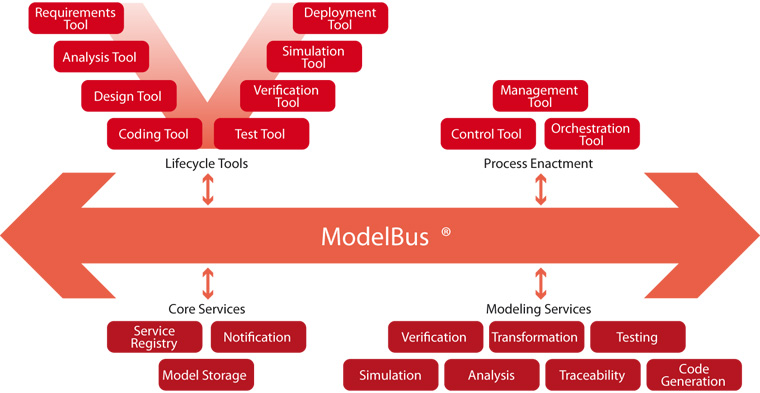ModelBus®
Automation, Integration and Collaboration in Development Processes
Increasing complexity in system development
Computer based systems are becoming more and more complex as they provide increasing functionality. They have to fulfill ever rising demands on availability and stability. It is getting harder for companies to deliver high quality complex systems in time. New and strict quality and safety regulations are putting additional pressure on system producers and solution providers. Development experts need more specialized tools than ever before to cope with all aspects of today’s complex systems. In addition, the globalization of system development leads to separate and remote supply chains, which may involve nearshore and offshore companies. Software and system development processes involve multiple development teams at various locations and need efficient coordination and control.
Tool interoperability and Application Lifecycle Management (ALM) is becoming the main factor for mastering the entire development process. Time and cost efficient processes combined with high quality software are essential to win the fierce competition on the software production market. Mastering the Application Lifecycle is the key aspect of successful software and system development. Challenges in the development process include: tool interoperability, collaboration, traceability, reporting and analytics, as well as process automation.
Mastering complexity
ModelBus® is a framework for managing complex development processes and integrating heterogeneous tools. It allows to integrate tools from different vendors serving different purposes. This integration creates a virtual bus-like tool environment, where data can be seamlessly exchanged between tools. This avoids the manual export and import of tool specific data, which is usually accompanied by manually executed data alignment steps. The data can be linked by establishing traceability. ModelBus® interoperable tool integration contributes to the collaboration of engineers and developers involved in the software and system development process. (The virtual bus architecture leverages information exchange between tools and developers.) Thus, it supports tcoordinated simultaneous work. ModelBus® automation is the key to increase the efficiency in a software and system development environment. ModelBus® facilitates the automatic and semi-automatic execution of process steps throughout the complete software development process.
Features of ModelBus®
-
Integration of software tools
-
Construction of integrated and automated tool chains
-
Support of collaboration of developers
-
Based on service-oriented architecture
Model-driven data management and service execution
The key concept of ModelBus® for tool interoperability is the virtual bus-like service-oriented architecture and the way it processes the data transmitted via this bus. ModelBus® can work on traditional artifacts like source code or binaries, but its full potential lies in the handling of models. Tool data can be transmitted via ModelBus® as well-defined MOF/EMF based models, which enables the full power of model-driven engineering practices to the ModelBus® data management. This includes the application of model-transformation techniques, consistency checks and full traceability across multiple process steps ranging from requirements to code for example.

Due to that approach every piece of information created during the development process is accessible and usable for the process and its control. Tools connected to ModelBus® can offer or consume services acting on these data. In that way functionality – provided by individual tools – becomes available for the whole development process and can be used in automated process steps.
Application and benefits of ModelBus®
ModelBus® is applicable in various domains including embedded systems design, IT-Business, automotive and avionics. The ModelBus® framework makes it possible to create flexible development solutions adapted to the customer’s needs. New tool adapters can be built upon request. It shows its full benefit in medium or large development processes but ModelBus® can be used for small solutions as well. Using ModelBus® will help to improve performance of the development and test processes by injecting automation to the highest possible degree. ModelBus® helps to keep the existing processes and tools unchanged. Therefore it helps to save licensing costs and training of developers.
The basic set of ModelBus® is open source and free software. Tool adapters, consultancy, support and maintenance services are available for establishing a ModelBus® based development scenario fitting to individual needs.
Technologies
ModelBus® uses only well-established and accepted standards, protocols and software packages.
Transportation
HTTP, HTTPS, XMPP, CXF, JMS, SOAP, OSLC
Orchestration
BPMN, BPEL, ODE
Core Technologies
DOSGi, SVN, Git, EMF